World War I
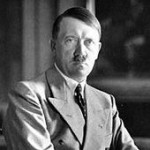
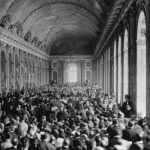 One would expect that after being defeated in a war, it would be understood that you don’t go up against the same adversary again, but apparently this concept was lost on Adolf Hitler. We all know who Hitler was, and that he was bent on taking over the world. There were things about him that had the people of Germany fooled into thinking that he was going to be a great leader, until his Nazi swastika became the symbol of hate and Anti-Semitism. In late June 1914, Archduke Franz Ferdinand of Austria was assassinated by a Serbian nationalist in Sarajevo, Bosnia. An escalation of threats and mobilization orders followed the incident, leading by mid-August to the outbreak of World War I, which pitted Germany, Austria-Hungary and the Ottoman Empire, called the Central Powers, against Great Britain, France, Russia, Italy and Japan, the Allied Powers. The Allies were joined after 1917 by the United States. The Great War, as it was then known, went on for four long years, and saw unprecedented levels of death and destruction, due mostly to grueling trench warfare and the introduction of modern weaponry such as machine guns, tanks and chemical weapons. By the time World War I ended in the defeat of the Central Powers in November 1918, more than 9 million soldiers had been killed and 21 million more were wounded. It makes me cringe to think of the good men lost because of hatred.
One would expect that after being defeated in a war, it would be understood that you don’t go up against the same adversary again, but apparently this concept was lost on Adolf Hitler. We all know who Hitler was, and that he was bent on taking over the world. There were things about him that had the people of Germany fooled into thinking that he was going to be a great leader, until his Nazi swastika became the symbol of hate and Anti-Semitism. In late June 1914, Archduke Franz Ferdinand of Austria was assassinated by a Serbian nationalist in Sarajevo, Bosnia. An escalation of threats and mobilization orders followed the incident, leading by mid-August to the outbreak of World War I, which pitted Germany, Austria-Hungary and the Ottoman Empire, called the Central Powers, against Great Britain, France, Russia, Italy and Japan, the Allied Powers. The Allies were joined after 1917 by the United States. The Great War, as it was then known, went on for four long years, and saw unprecedented levels of death and destruction, due mostly to grueling trench warfare and the introduction of modern weaponry such as machine guns, tanks and chemical weapons. By the time World War I ended in the defeat of the Central Powers in November 1918, more than 9 million soldiers had been killed and 21 million more were wounded. It makes me cringe to think of the good men lost because of hatred.
In July 1919, just eight months after the end of World War I, the Treaty of Versailles was signed, calling for stiff war reparation payments and other punishing peace terms for a defeated Germany. Having been forced to sign the treaty, the German delegation to the peace conference indicated its attitude by breaking the ceremonial pen. In my mind, that was indicative of what was to come. They felt like they shouldn’t have had to surrender or sign such an agreement, and they were telling the world that at some point they would break that treaty. As dictated by the Treaty of Versailles, Germany’s military forces were reduced to insignificance and the Rhineland, along the western border of Germany, was to be demilitarized. Nazi leader Adolf Hitler, well known for his hatred of authority, and for his lack of good sense as it turns out, would violate the Treaty of Versailles and the Locarno Pact by sending German military forces into the Rhineland just four years later.
By 1923, Adolf Hitler and the Nazi Party had seized full power in Germany, removing the rights of the people to have any say in their lives or in government. Hitler promised vengeance against the Allied nations that had 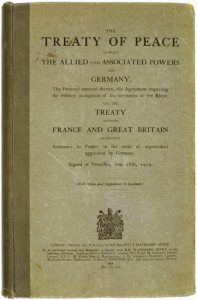
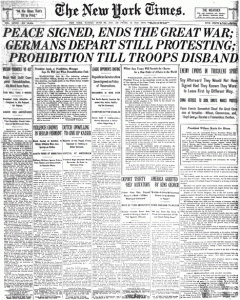 forced the Treaty of Versailles on the German people. In my opinion, the German people had nothing to do with it. The problem with the Treaty of Versailles and the Locarno Pact was Hitler’s on dislike of authority. In 1935, Hitler unilaterally canceled the military clauses of the treaty and in March 1936 denounced the Locarno Pact and began the remilitarizing of the Rhineland. Two years later, Nazi Germany burst out of its territories, absorbing Austria and portions of Czechoslovakia. In 1939, Hitler invaded Poland, leading to the outbreak of World War II in Europe. Hitler would be defeated in World War II, just as he was in World War I, and his suicide and complete show of cowardice would prove that he was not only hateful, but incredibly stupid as well.
forced the Treaty of Versailles on the German people. In my opinion, the German people had nothing to do with it. The problem with the Treaty of Versailles and the Locarno Pact was Hitler’s on dislike of authority. In 1935, Hitler unilaterally canceled the military clauses of the treaty and in March 1936 denounced the Locarno Pact and began the remilitarizing of the Rhineland. Two years later, Nazi Germany burst out of its territories, absorbing Austria and portions of Czechoslovakia. In 1939, Hitler invaded Poland, leading to the outbreak of World War II in Europe. Hitler would be defeated in World War II, just as he was in World War I, and his suicide and complete show of cowardice would prove that he was not only hateful, but incredibly stupid as well.
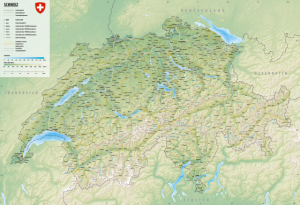 I think most of us know that a conscientious objector is a person who feels strongly about not killing…even in a war. However, there are actually entire countries who believe that way…or almost. The most well known country to claim neutrality is Switzerland. Other countries to claim non-interventionist stances include Ireland, Austria, and Costa Rica, but Switzerland is remains the oldest and most respected of them all. In fact, Switzerland has been in a state of perpetual neutrality for centuries. This state of neutrality does not mean they do not have an army, because they do. The country maintains an army for defense purposes and requires part-time military service from all males between the ages of 18 and 34. So how did this state of perpetual neutrality come about, and what does it mean exactly?
I think most of us know that a conscientious objector is a person who feels strongly about not killing…even in a war. However, there are actually entire countries who believe that way…or almost. The most well known country to claim neutrality is Switzerland. Other countries to claim non-interventionist stances include Ireland, Austria, and Costa Rica, but Switzerland is remains the oldest and most respected of them all. In fact, Switzerland has been in a state of perpetual neutrality for centuries. This state of neutrality does not mean they do not have an army, because they do. The country maintains an army for defense purposes and requires part-time military service from all males between the ages of 18 and 34. So how did this state of perpetual neutrality come about, and what does it mean exactly?
The earliest attempt by Switzerland, at neutrality came in 1515 when the Swiss Confederacy suffered a devastating loss to the French at the Battle of Marignano. After that, the country abandoned any thought of expanding it’s borders in an attempt to avoid future conflict. All this was done in the interest of self-preservation. The Napoleonic Wars, however, truly sealed Switzerland’s place as a neutral nation. Switzerland was invaded by France in 1798 and was later made a satellite of Napoleon Bonaparte’s empire, forcing it to compromise its neutrality. Napoleon was defeated, and the major European powers decided that a neutral Switzerland would provide a much needed buffer zone between France and Austria. It was assumed that their neutrality would bring stability to the region. Then during the 1815 Congress of Vienna, a declaration was signed affirming Switzerland’s state of “perpetual neutrality” within the international community. In 1920, the newly formed League of Nations officially recognized Swiss neutrality and established its headquarters in Geneva.
Switzerland’s state of perpetual neutrality has not been without it’s challenges. In World War I, it mobilized its army and accepted refugees but also refused to take sides militarily. An even bigger challenge to Switzerland’s neutrality came in World War II, when the country was surrounded by Axis powers. Switzerland continued in its neutral stance, saying that they would retaliate in the event of an invasion, but would not enter the war. Nevertheless, they continued to trade with Nazi Germany, a decision that caused controversy after the war ended.
After World War II, Switzerland has been active in international affairs by siding with humanitarian initiatives, while maintaining its neutrality when it came to military issues. 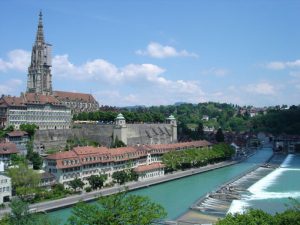 Switzerland refuses to join NATO or the European Union, and only joined the United Nations in 2002. In my opinion it might as well have stayed out of the United Nations entirely. I understand the desire to stay neutral and out of wars, but to me it seems a little bit like walking the fence. They want the good that’s offered without having to hold the evil nations accountable for their actions. I realize the Switzerland has done things for the rest of the world, but it still seems like a bit of a cop out when their trade is not affected because they refuse to argue the evil that some nations do.
Switzerland refuses to join NATO or the European Union, and only joined the United Nations in 2002. In my opinion it might as well have stayed out of the United Nations entirely. I understand the desire to stay neutral and out of wars, but to me it seems a little bit like walking the fence. They want the good that’s offered without having to hold the evil nations accountable for their actions. I realize the Switzerland has done things for the rest of the world, but it still seems like a bit of a cop out when their trade is not affected because they refuse to argue the evil that some nations do.
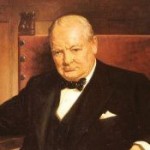 It’s always fun to find out that you are related to someone who is famous, and for me, it has been common knowledge for all of my life. The Spencer side of my family is full of aristocracy. Some are princes and princesses, and even future kings, and others were great strategists, like Winston Leonard Spencer-Churchill, who is my 15th cousin once removed. You will notice the hyphen, and while it isn’t in his name, it is nevertheless, correct. He was a product of grandparents who merged two wealthy family names, when his 4th great grandfather, Charles Spencer married Ann Churchill and they hyphenated the names. Later, family members either used the traditional Spencer name, such as Diana Spencer’s line, or they used the Churchill name, as Winston Churchill’s line did, even though they continued the Spencer part of the name in his line. People have often thought it was his middle name, but that is not so. I don’t know if they used the hyphen back then, but the names were both last names.
It’s always fun to find out that you are related to someone who is famous, and for me, it has been common knowledge for all of my life. The Spencer side of my family is full of aristocracy. Some are princes and princesses, and even future kings, and others were great strategists, like Winston Leonard Spencer-Churchill, who is my 15th cousin once removed. You will notice the hyphen, and while it isn’t in his name, it is nevertheless, correct. He was a product of grandparents who merged two wealthy family names, when his 4th great grandfather, Charles Spencer married Ann Churchill and they hyphenated the names. Later, family members either used the traditional Spencer name, such as Diana Spencer’s line, or they used the Churchill name, as Winston Churchill’s line did, even though they continued the Spencer part of the name in his line. People have often thought it was his middle name, but that is not so. I don’t know if they used the hyphen back then, but the names were both last names.
Churchill was born to Lord Randolph Spencer and his wife Jennie Jerome, on November 30, 1874. They were members of a prestigious family with a long history of military service and upon his father’s death in 1895, 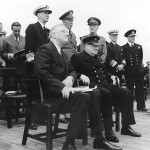 Winston joined the British Fourth Hussars. During the next five years, Winston Churchill enjoyed an illustrious military career, serving in India, the Sudan, and South Africa, and distinguishing himself several times in battle. In 1899, he resigned his commission to concentrate on his literary and political career and in 1900 was elected to Parliament as a Conservative MP from Oldham. In 1904, he began serving in a number of important posts before being appointed Britain’s First Lord of the Admiralty in 1911. Churchill foresaw a war that would bring with it a need for a navy that was ready, and well thought out strategies that would bring victory, and he worked to bring such a British Navy into existence. Churchill was a born strategist.
Winston joined the British Fourth Hussars. During the next five years, Winston Churchill enjoyed an illustrious military career, serving in India, the Sudan, and South Africa, and distinguishing himself several times in battle. In 1899, he resigned his commission to concentrate on his literary and political career and in 1900 was elected to Parliament as a Conservative MP from Oldham. In 1904, he began serving in a number of important posts before being appointed Britain’s First Lord of the Admiralty in 1911. Churchill foresaw a war that would bring with it a need for a navy that was ready, and well thought out strategies that would bring victory, and he worked to bring such a British Navy into existence. Churchill was a born strategist.
Winston Churchill’s military leadership took quite a blow during World War I, when he was held responsible for the disastrous Dardanelles and Gallipoli campaigns in 1915, and he was excluded from the war coalition government. He resigned his commission, and volunteered to command an infantry battalion in France. In 1917, Churchill returned to politics. He became a cabinet member of the Liberal government of Lloyd George, a move that I suspect he would regret. From 1919 to 1921, he was secretary of state for war. Then, in 1924 he returned to the Conservative Party, where two years later he played a leading role in the defeat of the General Strike of 1926. Out of office from 1929 to 1939, Churchill issued unheeded warnings of the threat of German 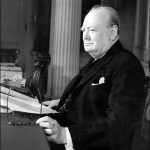 and Japanese attacks. After the outbreak of World War II in Europe, Churchill was called back to his post as First Lord of the Admiralty and eight months later replaced Neville Chamberlain, an ineffective military leader, as prime minister of a new coalition government. In the first year of his administration, Britain stood alone against Nazi Germany, but Churchill promised his country and the world that the British people would “never surrender.” He rallied the British people to a strong resistance and expertly orchestrated Franklin D Roosevelt and Joseph Stalin into an alliance that eventually crushed the Axis. Churchill proved himself to be the best military leader Britain could possibly have had at a time when he was desperately needed. Today would have been Winston Spencer Churchill’s 142nd birthday.
and Japanese attacks. After the outbreak of World War II in Europe, Churchill was called back to his post as First Lord of the Admiralty and eight months later replaced Neville Chamberlain, an ineffective military leader, as prime minister of a new coalition government. In the first year of his administration, Britain stood alone against Nazi Germany, but Churchill promised his country and the world that the British people would “never surrender.” He rallied the British people to a strong resistance and expertly orchestrated Franklin D Roosevelt and Joseph Stalin into an alliance that eventually crushed the Axis. Churchill proved himself to be the best military leader Britain could possibly have had at a time when he was desperately needed. Today would have been Winston Spencer Churchill’s 142nd birthday.
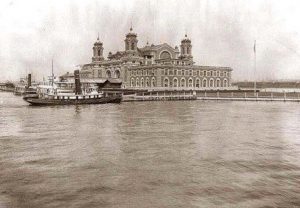 A number of my ancestors came to America during and prior to the years that Ellis Island was the processing center in New York. I have no doubt that some of them came through Ellis Island, but I have not confirmed that. I find many of the names in my tree, but while many of the ancestors I have found came over by way of New York, it would appear that my direct line arrived in America before the immigration center at Ellis Island opened on January 2, 1892. Before that time, immigrants were handled by the individual states where the immigrant first arrived. It is estimated that about 40% of Americans can trace their roots through Ellis Island, so while I see many familiar names, they may or may not be my direct line, and in fact, they might not be related at all.
A number of my ancestors came to America during and prior to the years that Ellis Island was the processing center in New York. I have no doubt that some of them came through Ellis Island, but I have not confirmed that. I find many of the names in my tree, but while many of the ancestors I have found came over by way of New York, it would appear that my direct line arrived in America before the immigration center at Ellis Island opened on January 2, 1892. Before that time, immigrants were handled by the individual states where the immigrant first arrived. It is estimated that about 40% of Americans can trace their roots through Ellis Island, so while I see many familiar names, they may or may not be my direct line, and in fact, they might not be related at all.
Ellis Island is located in New York Harbor off the New Jersey coast and was named for merchant Samuel Ellis, who owned the land in the 1770s. The island was given the nickname, The Gateway to America because more than 12 million immigrants passed through the center since it opened in 1892. On January 2, 1892, 15 year old Annie Moore, from Ireland, became the first person to pass through the newly opened Ellis Island, which President Benjamin Harrison designated as America’s first federal immigration center in 1890. Oddly, not all 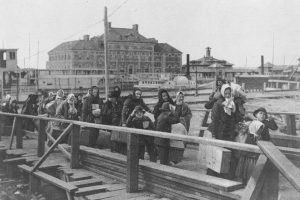 immigrants who sailed into New York had to go through Ellis Island. First and second class passengers were just given a brief shipboard inspection and then disembarked at the piers in New York or New Jersey, where they passed through customs. People in third class, though, were transported to Ellis Island, where they underwent medical and legal inspections to ensure they didn’t have a contagious disease or some condition that would make them a burden to the government. Nevertheless, only two percent of all immigrants were denied entrance into the United States. The peak years of immigration through Ellis Island were from 1892 to 1924. The 3.3 acre island was enlarged by landfill, and by the 1930s, it had reached its current size of 27.5 acres. After the extra size was completed, new buildings were constructed to handle the massive influx of people coming to America for a better life. During it’s busiest year, which was 1907, over 1 million people were processed through Ellis Island.
immigrants who sailed into New York had to go through Ellis Island. First and second class passengers were just given a brief shipboard inspection and then disembarked at the piers in New York or New Jersey, where they passed through customs. People in third class, though, were transported to Ellis Island, where they underwent medical and legal inspections to ensure they didn’t have a contagious disease or some condition that would make them a burden to the government. Nevertheless, only two percent of all immigrants were denied entrance into the United States. The peak years of immigration through Ellis Island were from 1892 to 1924. The 3.3 acre island was enlarged by landfill, and by the 1930s, it had reached its current size of 27.5 acres. After the extra size was completed, new buildings were constructed to handle the massive influx of people coming to America for a better life. During it’s busiest year, which was 1907, over 1 million people were processed through Ellis Island.
When the United States entered into World War I, immigration to the United States decline, most likely because travel anywhere was risky. Ellis Island was used as a detention center for suspected enemies during that time. Following the war, Congress passed quota laws and the Immigration Act of 1924, which sharply reduced the number of newcomers allowed into the country and also enabled immigrants to be processed at United States  consulates abroad. The act also enabled immigrants to be processed at United States consulates abroad, making detention at Ellis Island obsolete. After 1924, Ellis Island switched from a processing center to other purposes, such as a detention and deportation center for illegal immigrants, a hospital for wounded soldiers during World War II and a Coast Guard training center. In November 1954, the last detainee, a Norwegian merchant seaman, was released and Ellis Island officially closed on November 12, 1954. In 1984, Ellis Island underwent a $160 million renovation, the largest historic restoration project in United States history. In September 1990, the Ellis Island Immigration Museum opened to the public and is visited by almost 2 million people each year.
consulates abroad. The act also enabled immigrants to be processed at United States consulates abroad, making detention at Ellis Island obsolete. After 1924, Ellis Island switched from a processing center to other purposes, such as a detention and deportation center for illegal immigrants, a hospital for wounded soldiers during World War II and a Coast Guard training center. In November 1954, the last detainee, a Norwegian merchant seaman, was released and Ellis Island officially closed on November 12, 1954. In 1984, Ellis Island underwent a $160 million renovation, the largest historic restoration project in United States history. In September 1990, the Ellis Island Immigration Museum opened to the public and is visited by almost 2 million people each year.
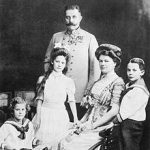
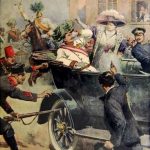 It’s amazing to me that one act of hate can bring so many people to war, but that was what happened with World War I. On June 28, 1914, Archduke Franz Ferdinand of Austria, and his wife, Sophie, Duchess of Hohenberg, were assassinated by a Serbian nationalist in Sarajevo, Bosnia. The assassin, Gavrilo Princip was an ethnic Serb and Yugoslav nationalist from the group Young Bosnia, which was supported by the Black Hand, a nationalist organization in Serbia. The outraged Austrian people and its government threatened mobilization of troops to seek vengeance for their beloved leader and his family.
It’s amazing to me that one act of hate can bring so many people to war, but that was what happened with World War I. On June 28, 1914, Archduke Franz Ferdinand of Austria, and his wife, Sophie, Duchess of Hohenberg, were assassinated by a Serbian nationalist in Sarajevo, Bosnia. The assassin, Gavrilo Princip was an ethnic Serb and Yugoslav nationalist from the group Young Bosnia, which was supported by the Black Hand, a nationalist organization in Serbia. The outraged Austrian people and its government threatened mobilization of troops to seek vengeance for their beloved leader and his family.
The crisis escalated as the conflict between Austria-Hungary and Serbia came to involve Russia, Germany, France, and ultimately Belgium and Great Britain. By mid-August of 1914, the crisis had become a full blown war, with Germany, Austria Hungary and the Ottoman Empire, known as the Central Powers, against Great Britain, France, Russia, Italy and Japan, the Allied Powers. The United States would also enter the war as a part of the Allied Powers in 1917. Other factors came into play during the diplomatic crisis that preceded the war, such as misperceptions of intent in that Germany believed that Britain would remain neutral, the belief that war was inevitable, and the speed of the crisis, which was exacerbated by delays and misunderstandings in diplomatic communications. The four years of the Great War…as it was dubbed…saw unprecedented levels of carnage and destruction, thanks to grueling trench warfare and the introduction of modern weaponry such as machine guns, tanks and chemical weapons. By the time World War I ended in the defeat of the Central Powers in November 1918, more than 9 million soldiers had been killed and 21 million more wounded.
Evil exists in this world, and it gets worse every day, and assassinations are not new. Chanakya, 350–283 BC, an Indian teacher, philosopher and royal advisor, wrote about assassinations in detail in his political treatise Arthashastra. Later, his student Chandragupta Maurya, the founder of the Maurya Empire of India, made use of assassinations against some of his enemies, including two of Alexander’s generals Nicanor and Philip. I suppose it should not be a surprise, yet every assassination brings with it shock, fear, and rage. 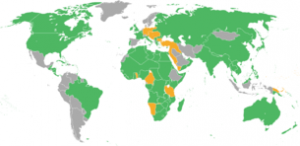
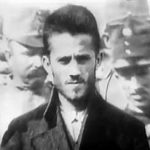 Countless wars have been fought over one nation’s ruler being killed by someone from another nation. War will be a part of our world until the end of time, but that in no way lessens the worry, fear, and sadness that war always brings. Still, like the Allies of World War I, we cannot let one group or nation hold power over another group or nation…which also explains the need to destroy ISIS.
Countless wars have been fought over one nation’s ruler being killed by someone from another nation. War will be a part of our world until the end of time, but that in no way lessens the worry, fear, and sadness that war always brings. Still, like the Allies of World War I, we cannot let one group or nation hold power over another group or nation…which also explains the need to destroy ISIS.
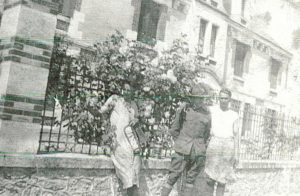 War is never pretty, and yet somehow, I had a picture in my head of the time my grandfather, George Byer spent in World War I that made it seem very benign. I never pictured him being in any danger. You see, my grandfather was a cook in the Army during the war, and somehow I pictured him working in a safe place where the war was a very distant reality, and not something to be faced or dealt with. The cooks in World War I didn’t even get a gun, so they must not be in danger…right? Wrong…very wrong!! The men on the front couldn’t drive home to the safety zone every night after work, like I had pictured in my head. The kitchen was very close to the front. In Grandpa’s case, that kitchen was a commandeered kitchen in the lowest floor of a French castle. As far as anyone knows, the residents of the castle still lived there, although I’m not sure how their meals were handled. Perhaps, their own cooks were allowed a little time in the kitchen, or maybe their meals were served along with the men in the Army. I don’t suppose we will know the full answer to that question in this lifetime.
War is never pretty, and yet somehow, I had a picture in my head of the time my grandfather, George Byer spent in World War I that made it seem very benign. I never pictured him being in any danger. You see, my grandfather was a cook in the Army during the war, and somehow I pictured him working in a safe place where the war was a very distant reality, and not something to be faced or dealt with. The cooks in World War I didn’t even get a gun, so they must not be in danger…right? Wrong…very wrong!! The men on the front couldn’t drive home to the safety zone every night after work, like I had pictured in my head. The kitchen was very close to the front. In Grandpa’s case, that kitchen was a commandeered kitchen in the lowest floor of a French castle. As far as anyone knows, the residents of the castle still lived there, although I’m not sure how their meals were handled. Perhaps, their own cooks were allowed a little time in the kitchen, or maybe their meals were served along with the men in the Army. I don’t suppose we will know the full answer to that question in this lifetime.
For a very long time…until just a few months ago, in fact, I carried the impression in my head that Grandpa’s job was really uneventful, other than the pressure of getting the meals to a large group of hungry men on time. Then, I came across a picture that I had seen several times over the past five years, but this time I was also 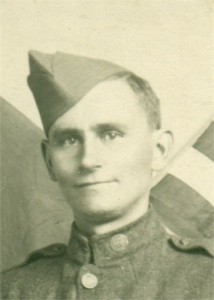 looking at the list my aunts had made about what the pictures were about. In that moment, my idea of my grandfather’s service was changed forever. On the list they had written, that the man on the right, or the man in uniform, was Grandpa. The second picture was tagged with, “Castle in France. Owner of castle died in Daddy’s kitchen” and “cooks, who worked under Daddy.” I was instantly intrigued. I spoke to my aunt, Sandy Pattan about it, and found out that indeed, the kitchen was commandeered for the Army’s use, and the owner had been wounded and ran into the kitchen for help. Grandpa tried to save him, but the wounds were too bad, and the owner died right there. The man’s injuries told me that the front was not far from the castle. I suppose you might think I was reaching a little on that thought, but you would be wrong, because as I talked with Aunt Sandy, she told me something else that really clarified the danger my grandfather lived with every day of his time in the service.
looking at the list my aunts had made about what the pictures were about. In that moment, my idea of my grandfather’s service was changed forever. On the list they had written, that the man on the right, or the man in uniform, was Grandpa. The second picture was tagged with, “Castle in France. Owner of castle died in Daddy’s kitchen” and “cooks, who worked under Daddy.” I was instantly intrigued. I spoke to my aunt, Sandy Pattan about it, and found out that indeed, the kitchen was commandeered for the Army’s use, and the owner had been wounded and ran into the kitchen for help. Grandpa tried to save him, but the wounds were too bad, and the owner died right there. The man’s injuries told me that the front was not far from the castle. I suppose you might think I was reaching a little on that thought, but you would be wrong, because as I talked with Aunt Sandy, she told me something else that really clarified the danger my grandfather lived with every day of his time in the service.
It was another day in the castle kitchen, the men were working on the next meal. Suddenly an American soldier ran in and told the cooks to run for the woods. It seemed strange to me that running would be the order they would receive, but remember that Aunt Sandy told me that the cooks had no guns. If they stayed in the castle, they would be sitting ducks, because cooks or not, they were in the American Army, and that made them enemies of the Germans. The reason the men were told to run for the woods…the Germans were coming 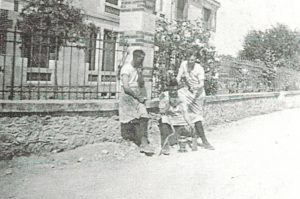 and they couldn’t stop them. The soldier didn’t have to tell the cooks twice. They dropped everything and ran. One of the cooks, while running into the woods, stepped on a dead man. The man had been dead a few days, because the cook’s foot went right into the man’s chest. Aunt Sandy told me that the smell was so bad and so permanent that when they couldn’t get the smell out of the man’s clothes, they had to be burned. I had no idea of the things Grandpa saw, nor of the danger he faced. It gave me a whole new picture of Grandpa Byer’s time in World War I. And I came to clearly realize that no job in the service is less dangerous than another…and least not on the front. It’s no wonder that most men don’t want to talk about the war.
and they couldn’t stop them. The soldier didn’t have to tell the cooks twice. They dropped everything and ran. One of the cooks, while running into the woods, stepped on a dead man. The man had been dead a few days, because the cook’s foot went right into the man’s chest. Aunt Sandy told me that the smell was so bad and so permanent that when they couldn’t get the smell out of the man’s clothes, they had to be burned. I had no idea of the things Grandpa saw, nor of the danger he faced. It gave me a whole new picture of Grandpa Byer’s time in World War I. And I came to clearly realize that no job in the service is less dangerous than another…and least not on the front. It’s no wonder that most men don’t want to talk about the war.
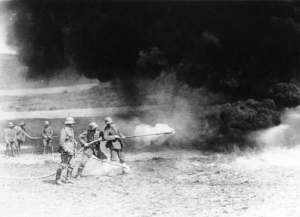 Over the centuries of life on Earth, there have been numerous wars, and numerous weapons of warfare. Yet, few could bring fear to the heart of an infantryman quicker than the Flammenwerfer. Developed by the Germans during World War I, the Flammenwerfer…or Flamethrower, in English…once lit could throw a steady stream of flames 20 to 30 feet in front of it. For the men on the ground, this meant one of two things. They could run…abandoning the relative safety of their foxhole, usually with the result of being shot down by the enemy, or they could stand their ground and be incinerated. It wasn’t much of a choice really, and most ran in the hope of escaping the machine gun fire that would undoubtedly follow the flamethrower. It was a situation of instant death…no matter which choice a soldier made…not to mention the fact that every fiber of a soldier’s being and training told them to stand their ground. This weapon took much of it toll on the soldier’s sense of bravery.
Over the centuries of life on Earth, there have been numerous wars, and numerous weapons of warfare. Yet, few could bring fear to the heart of an infantryman quicker than the Flammenwerfer. Developed by the Germans during World War I, the Flammenwerfer…or Flamethrower, in English…once lit could throw a steady stream of flames 20 to 30 feet in front of it. For the men on the ground, this meant one of two things. They could run…abandoning the relative safety of their foxhole, usually with the result of being shot down by the enemy, or they could stand their ground and be incinerated. It wasn’t much of a choice really, and most ran in the hope of escaping the machine gun fire that would undoubtedly follow the flamethrower. It was a situation of instant death…no matter which choice a soldier made…not to mention the fact that every fiber of a soldier’s being and training told them to stand their ground. This weapon took much of it toll on the soldier’s sense of bravery.
The Flammenwerfer was developed in 1915 by the Germans, and first used in battle against the Allied forces on this day, July 30, 1915 at the Battle of Hooge. Eleven days before that battle, British infantry had captured the German occupied village of Hooge, located near Ypres in Belgium, by detonating a large mine. Using the flamethrowers, along with machine guns, trench mortars and hand grenades, the Germans got their positions 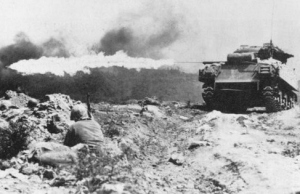 back on July 30, 1915. They broke through enemy front lines with ease, pushing the British forces back to their second trench. Only a few men were lost to actual burns, but a British officer was heard to explain that the weapons had a great demoralizing effect, and when added to the assault of the other powerful weapons, they proved mercilessly efficient at Hooge. I suppose that is true. I can think of few things more demoralizing for a soldier than running from your position in fear. Soldiers don’t take kindly to fear…or running away.
back on July 30, 1915. They broke through enemy front lines with ease, pushing the British forces back to their second trench. Only a few men were lost to actual burns, but a British officer was heard to explain that the weapons had a great demoralizing effect, and when added to the assault of the other powerful weapons, they proved mercilessly efficient at Hooge. I suppose that is true. I can think of few things more demoralizing for a soldier than running from your position in fear. Soldiers don’t take kindly to fear…or running away.
During World War I, the Germans were the only ones to use such a weapon, and not because it was difficult to make. So, why didn’t the Allies us it too? It was one of the great puzzles that emerged from World War I. Why? The British made three attempts with larger, more unwieldy prototypes: the smallest one was equal in size to the German Grof, which the enemy had almost abandoned by 1916. The French were more persistent, and by 1918 had at least seven companies trained in using flamethrowers, and still the use of the weapon never progressed to the same level as that of the German army.
By World War II, however, the flamethrower was the most dramatic hand weapon used by any Army and the most effective for its purpose. But it was during the 20th century that engineers and scientists placed flames 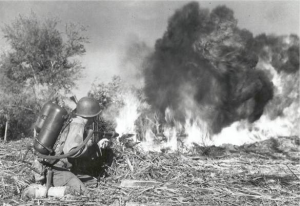 under advanced technological control in an effort to make flamethrowers portable, reliable and reasonably safe…for the user anyway. Prior to that the words “friendly fire” had a second meaning in that flamethrowers could kill the operator while he was doing his best to kill the enemy with it. The result of this new technology was a device with as much psychological impact as it’s lethality impact. That was the chief reason why the United States, Great Britain and other world powers used the flamethrower from World War I through the Vietnam War. Even today, Russia still has flamethrowers in its inventory. I guess it is an important weapon, but for most of us, I think that just the thought of using it on someone would make us seriously ill.
under advanced technological control in an effort to make flamethrowers portable, reliable and reasonably safe…for the user anyway. Prior to that the words “friendly fire” had a second meaning in that flamethrowers could kill the operator while he was doing his best to kill the enemy with it. The result of this new technology was a device with as much psychological impact as it’s lethality impact. That was the chief reason why the United States, Great Britain and other world powers used the flamethrower from World War I through the Vietnam War. Even today, Russia still has flamethrowers in its inventory. I guess it is an important weapon, but for most of us, I think that just the thought of using it on someone would make us seriously ill.
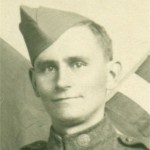 My grandpa, George Byer served in the Army as a cook during World War I. He always prided himself on making sure the men had the best meals he was able to make. Wartime doesn’t always mean that the men have the tastiest of meals. In fact, the meals are pretty basic most of the time. Even in this day and age, the men in a war zone often have MREs…which is Meals Ready to Eat. They are basically dried food. They can be eaten as they are, because its not always convenient to heat them. The idea is to create a meal to keep our troops running strong out in the field. They are packed full of calories and nutrients. Of course, that doesn’t mean that they are packed full of taste.
My grandpa, George Byer served in the Army as a cook during World War I. He always prided himself on making sure the men had the best meals he was able to make. Wartime doesn’t always mean that the men have the tastiest of meals. In fact, the meals are pretty basic most of the time. Even in this day and age, the men in a war zone often have MREs…which is Meals Ready to Eat. They are basically dried food. They can be eaten as they are, because its not always convenient to heat them. The idea is to create a meal to keep our troops running strong out in the field. They are packed full of calories and nutrients. Of course, that doesn’t mean that they are packed full of taste.
Still, when I look back at my great aunt, Bertha Schumacher Hallgren’s journal, when  she spoke of the food the men had to eat during the Civil War, I have to feel awful for those brave men. She spoke of Hardtack, which was served to both armies. It was basically a thick cracker, that they could carry with them. Because of the lack of preservatives in those days, Hardtack was often wormy. It was so wormy, in fact, that the men called them Worm Castles. Hardtack was so hard that the men joked…if you bite into something soft, you might think it’s a worm, but it’s probably a ten penny nail…now that is a hard cracker. When I think of our brave men having to eat such food, it makes me feel nauseous. These are the people that we sent out to fight our battles, while we are safe at home, and here they are eating such awful things. Still, it
she spoke of the food the men had to eat during the Civil War, I have to feel awful for those brave men. She spoke of Hardtack, which was served to both armies. It was basically a thick cracker, that they could carry with them. Because of the lack of preservatives in those days, Hardtack was often wormy. It was so wormy, in fact, that the men called them Worm Castles. Hardtack was so hard that the men joked…if you bite into something soft, you might think it’s a worm, but it’s probably a ten penny nail…now that is a hard cracker. When I think of our brave men having to eat such food, it makes me feel nauseous. These are the people that we sent out to fight our battles, while we are safe at home, and here they are eating such awful things. Still, it  was what they had, that and dried or salted meats.
was what they had, that and dried or salted meats.
I suppose they got used to the food, but I still think that is was sad that we as a people were not able to give them food that was safe to eat. I have to think back on the MREs, and while they might not taste great, at least they don’t have worms. And I have to wonder what Aunt Bertha would have thought of the MRE. She had seen so many awful foods that the men had to eat, but to think of them eating something that was dried…well, that would be just strange. Maybe the MREs weren’t the tastiest meals, but at least they were safe to eat, and many a soldier has survived on them for sure. I guess that sometimes you just have to do what you have to do.
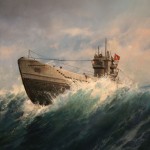 Submarines have been around a long time, but during the world wars, Germany built a submarine that was superior to any other submarine of the time. Called the U-Boat, the name was short for Unterseeboot, or under sea boat. Winston Churchill said, “the only thing that ever really frightened me during the war was the U-boat peril.” Churchill identified the threat that the U-Boats posed. The Atlantic Lifeline was vital to Britain’s survival. If Germany had been able to prevent merchant ships from carrying food, raw materials, troops and their equipment from North America to Britain, the outcome of World War II could have been very different. Britain might have been starved into submission, and her armies would not have been equipped with American built tanks and vehicles. The U-Boats were a serious threat. The Battle of the Atlantic was a must win situation. If Germany won that battle, Britain would likely have lost the war.
Submarines have been around a long time, but during the world wars, Germany built a submarine that was superior to any other submarine of the time. Called the U-Boat, the name was short for Unterseeboot, or under sea boat. Winston Churchill said, “the only thing that ever really frightened me during the war was the U-boat peril.” Churchill identified the threat that the U-Boats posed. The Atlantic Lifeline was vital to Britain’s survival. If Germany had been able to prevent merchant ships from carrying food, raw materials, troops and their equipment from North America to Britain, the outcome of World War II could have been very different. Britain might have been starved into submission, and her armies would not have been equipped with American built tanks and vehicles. The U-Boats were a serious threat. The Battle of the Atlantic was a must win situation. If Germany won that battle, Britain would likely have lost the war.
From 1918 on, Germany was not supposed to have submarines or submarine crews. However, no checks were in place to stop any research into submarines in Germany and it became clear that during the 1930’s, Germany had been investing time and men into submarine research. Their research and subsequent development of the U-Boat made it a submarine that was very difficult to locate and that made it extremely dangerous. They developed the Enigma machine, which was a series of electro-mechanical rotor cipher machines developed and 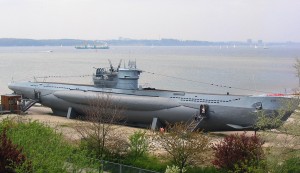 used in the early to early-mid twentieth century for commercial and military usage. Enigma was invented by the German engineer Arthur Scherbius at the end of World War I. The codes it could provide were difficult to decipher. German military messages enciphered on the Enigma machine were first broken by the Polish Cipher Bureau, in December 1932. This success was a result of efforts by three Polish cryptologists, Marian Rejewski, Jerzy Rózycki and Henryk Zygalski, working for Polish military intelligence. Rejewski reverse-engineered the device, using theoretical mathematics and material supplied by French military intelligence. Then, the three mathematicians designed mechanical devices for breaking Enigma ciphers, including the cryptologic bomb. In 1938, the Germans made the machine more complex, and increased complexity was repeatedly added to the Enigma machines, making decryption more difficult and requiring further equipment and personnel. It was more than the Poles could readily produce.
used in the early to early-mid twentieth century for commercial and military usage. Enigma was invented by the German engineer Arthur Scherbius at the end of World War I. The codes it could provide were difficult to decipher. German military messages enciphered on the Enigma machine were first broken by the Polish Cipher Bureau, in December 1932. This success was a result of efforts by three Polish cryptologists, Marian Rejewski, Jerzy Rózycki and Henryk Zygalski, working for Polish military intelligence. Rejewski reverse-engineered the device, using theoretical mathematics and material supplied by French military intelligence. Then, the three mathematicians designed mechanical devices for breaking Enigma ciphers, including the cryptologic bomb. In 1938, the Germans made the machine more complex, and increased complexity was repeatedly added to the Enigma machines, making decryption more difficult and requiring further equipment and personnel. It was more than the Poles could readily produce.
Finally there was a breakthrough. The astonishing achievements of the codebreakers of Bletchley Park saved countless lives. At their peak, there were 12,000 codebreakers at Bletchley Park, 8,000 of them women. The codebreakers helped bring victory in North Africa by giving British commander General Montgomery details of 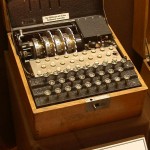 Erwin Rommel’s battle plans and providing the routes of the Nazi supply convoys. This allowed the Royal Navy the opportunity to sink them. Prior to the codebreakers, the U-Boats were only sunk after damage or near damage was done to other ships. Such was the case with the first sinking of a U-Boat. German submarine U-39 was a Type IXA U-boat of the Kriegsmarine that operated from 1938 to the first few days of World War II. On 14 September 1939, just 27 days after she began her first patrol, U-39 attempted to sink the British aircraft carrier HMS Ark Royal by firing two torpedoes at her. The torpedoes malfunctioned and exploded just short of the carrier. In retaliation, U-39 was immediately hunted down by three British destroyers. She was disabled with depth charges, and subsequently sunk. All crew members survived and were captured.
Erwin Rommel’s battle plans and providing the routes of the Nazi supply convoys. This allowed the Royal Navy the opportunity to sink them. Prior to the codebreakers, the U-Boats were only sunk after damage or near damage was done to other ships. Such was the case with the first sinking of a U-Boat. German submarine U-39 was a Type IXA U-boat of the Kriegsmarine that operated from 1938 to the first few days of World War II. On 14 September 1939, just 27 days after she began her first patrol, U-39 attempted to sink the British aircraft carrier HMS Ark Royal by firing two torpedoes at her. The torpedoes malfunctioned and exploded just short of the carrier. In retaliation, U-39 was immediately hunted down by three British destroyers. She was disabled with depth charges, and subsequently sunk. All crew members survived and were captured.
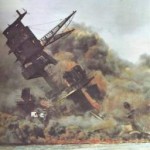
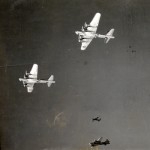 World War II had been raging since September 1, 1939. It was without doubt the most destructive war in history. Some say it was simply a continuation of World War I, that had ended in 1918. Others will blame the 1931 Japanese seizure of Manchuria from China, or Italy’s invasion and defeat of Ethiopia in 1935, or Adolf Hitler’s re-militarization of Germany in 1936, or the Spanish Civil War 1936 to 1939, or Germany’s occupation of Czechoslovakia in 1938 as possible beginnings. But, the two dates most often mentioned as “the beginning of World War II” are July 7, 1937, when the “Marco Polo Bridge Incident” led to war between Japan and China, and September 1, 1939, when Germany invaded Poland, which led Britain and France to declare war on Hitler’s Nazi state in retaliation. To me it would seem that the tensions that had begun before World War I, simply never went away. It would seem that there were many world leaders who were power hungry, and greedy for the lands that belonged to their neighbors. And when you look at the Middle East today, maybe not much has really changed.
World War II had been raging since September 1, 1939. It was without doubt the most destructive war in history. Some say it was simply a continuation of World War I, that had ended in 1918. Others will blame the 1931 Japanese seizure of Manchuria from China, or Italy’s invasion and defeat of Ethiopia in 1935, or Adolf Hitler’s re-militarization of Germany in 1936, or the Spanish Civil War 1936 to 1939, or Germany’s occupation of Czechoslovakia in 1938 as possible beginnings. But, the two dates most often mentioned as “the beginning of World War II” are July 7, 1937, when the “Marco Polo Bridge Incident” led to war between Japan and China, and September 1, 1939, when Germany invaded Poland, which led Britain and France to declare war on Hitler’s Nazi state in retaliation. To me it would seem that the tensions that had begun before World War I, simply never went away. It would seem that there were many world leaders who were power hungry, and greedy for the lands that belonged to their neighbors. And when you look at the Middle East today, maybe not much has really changed.
Wherever you place the beginning of World War II, you would agree that while the Japanese and the Germans may not have been war weary, the rest of the world really was. Before the Japanese attacked Pearl Harbor on December 7, 1941, the United States had somehow managed to stay out of the conflict. Whether that was right or wrong is a matter of opinion too. Nevertheless, when the Japanese brought the war to our front door, the United States answered with a vengeance. I’m sure the allies were glad to have the reinforcements, but also wondered why it had taken so long for us to get involved. Sometimes, I have wondered that myself, about that and other wars that we have come into just a little bit late in the game.
That said, we got into the war, and I believe that the extra military might that the United States brought to the Allied Forces was the tipping point in the war, because a war that had officially raged since September 1, 1939, was brought to an end on September 2, 1945, when Victory over Japan was celebrated in the United States. Japanese troops finally surrendered to Americans on the Caroline, Mariana, and Palau islands. Representatives of their emperor and prime minister were preparing to formalize their declaration of defeat. In Tokyo Bay, aboard the Navy battleship USS Missouri, Japanese foreign minister, Mamoru Shigemitsu and chief of staff of the Japanese army, Yoshijiro Umezu, signed the “instrument of surrender.” General Douglas MacArthur, commander of the US Army forces in the Pacific, and Admiral Chester Nimitz, commander of the US Pacific Fleet were there to represent the Allied victors.
After the surrender, Mamoru Shigemitsu was found guilty of war crimes. He was sentenced to seven years in prison. Oddly, it was he who had fought for concessions on the Japanese side in an attempt to secure an early peace. He was paroled in 1950 and went on to become chairman of Japan’s Progressive Party. General 
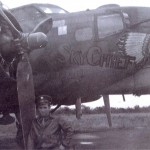 MacArthur would come up against him again when he was named commander in chief of the United Nations forces in Korea in 1950. For some people, it would seem, that one defeat simply isn’t enough, but that is another story. Today is VJ Day…Victory over Japan Day. It may not be a day that we remember as well as we do D Day, which simply stands for the day designated to storm the beaches at Normandy, or the attack on Pearl Harbor, but VJ Day is in reality as important a day as those others too, because it was the day that ended the world’s worst, and most destructive war.
MacArthur would come up against him again when he was named commander in chief of the United Nations forces in Korea in 1950. For some people, it would seem, that one defeat simply isn’t enough, but that is another story. Today is VJ Day…Victory over Japan Day. It may not be a day that we remember as well as we do D Day, which simply stands for the day designated to storm the beaches at Normandy, or the attack on Pearl Harbor, but VJ Day is in reality as important a day as those others too, because it was the day that ended the world’s worst, and most destructive war.

